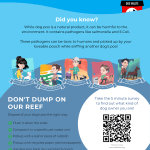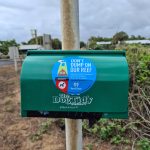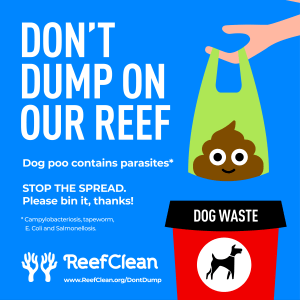Don’t Dump On Our Reef SRP
Source Reduction Plan (SRP) Overview
Name of SRP
Partners Delivering the SRP
- Tangaroa Blue Foundation – Project lead of SRP, responsible for volunteer engagement, data collection and synthesis, project reporting.
- ReefClean
- Douglas Shire Council
- 55 Knots – A graphic design company that generously donated their time to create the caricatures depicting each of the 5 types of personalities for the quiz
- Gladstone Veterinary Clinic – displaying information
- Angel Paws – Information and engagement stall at an event
- Dog Culture – hosting our information on their website
Location
- Great Barrier Reef
- Townsville – case study
- Port Douglas trial
Photo 1
Evidence of the issue
Photo 2
Evidence of SRP resources

Photo 3
Evidence of positive outcomes

Overall Goals & Background
Targeted Debris
Dog Poo & Single Use Bags
Many dog owners see their pets’ waste as a natural product, which leads to a large number of dog owners leaving their dog waste to degrade in the environment. Despite this statement being of truth, dog waste does contain a large number of pathogens and nutrients. The environment is able to break down these pathogens and nutrients up to a certain load, however current statistics from the Australian census demonstrate that a large number of dogs are registered within suburban areas and that numbers are on the rise (with an increase just shy of 1 million from 2013 to 2019). This has led to an increased load of waste produced within a smaller area, surpassing the environmental threshold for natural waste management.
For those dog owners that do pick up their pets’ waste, many use plastic products to do so. This in turn creates another debris item, and often is not disposed of correctly.
Why is the SRP needed?
The AMDI Database shows that single-use plastic items like dog poo bags are a major litter issue facing the GBR and waterways across Australia. Not only is the plastic material the bags are made of detrimental to the reef, many dog owners don’t realise how toxic the poo itself is.
There is a lot of greenwashing when it comes to selling dog poo bags with companies claiming their “biodegradable”, “photo-degradable” “compostable” etc. The reality is that they all mean different things and many of them turn out to be just as bad as plastic!
- We would like to address the wording and definitions used and encourage buyers to make informed choices of bags.
- We would like to encourage dog-owners to pick up after their dog, and dispose of it appropriately in the most eco-friendly way possible.
Logistics
Timeline and Project Goals
This SRP was implemented in 2021 – to help educate dog owners about the impact dog poo and single-use plastic dog poo bags have on the Great Barrier Reef.
The Don’t Dump on Our Reef campaign included some of the following strategies:
- Running a targeted campaign to roll out dog poo bin signage at a number of hotspot locations around the reef.
- Supporting the campaign with an educational fact sheet and a broader social promotion encouraging people to pick up their dog poo and bin their single-use plastic dog poo bags.
- Monitoring the number of dog poo bags left in these hotspots before and after the signage is implemented.
- Working with councils, vet services and other relatable businesses to spread the word within local communities
- Working with dog poo bag manufacturers to provide clarity around messaging for their products, so that dog owners don’t think it’s ok to leave the bags in the environment.
- Information stalls at events to engage and educate dog owners
Measuring Success
Assets – 3 Fact Sheets A4 & A5, Posters, Stickers, Flyers
Media Assets – Multiple social media posts, downloadable campaign imagery that are encouraged to be used on social channels and a fun quiz ‘what kind of dog owner are you?’ for owners to answer.
Information page published on dogculture.com.au
We produced a webpage which was launched and featured on the front page of the “Dog Culture” website on the 28th of September 2021. This website contains essential background information regarding the negative environmental impacts of dog poo and how to properly dispose of the waste products in a green way. Included on this website is a PDF version of the double-sided factsheet which can be readily downloaded by visitors to the site and distributed at their convenience, and also the link to the published online personality quiz.
Community engagement – Our targeted audience is local dog owners and related businesses within the highlighted hotspot areas. We contacted or visited pet stores, spoke with 45 veterinary clinics and attended the Angel Paws pledge event with a stall to showcase the campaign and maximise audience reach.
Data Collection & Reporting
Audits – Following several audits, we measured the success of the posters, stickers and fact sheets by monitoring the number of dog poo bags left within the highlighted hotspot areas before and after signage was implemented.
Results and Reflections
Positive Outcomes
We were able to engage a number of businesses and individuals (both in person and online) during the implementation of this source reduction plan on how to appropriately dispose of dog waste.
By the end of the implemented plan, 94% online personality quiz respondents said they were “proud to pick up” their dog’s poo
Media Audience Reached –
- Facebook and Instagram – 5 posts, 2626 audience reaches and 61 positive engagements
- Quiz Entries – 18 people answering the quiz
- Tangaroa Blue website articles
- Dog Culture website article & front page
Funding
Challenges & Improvements
Unfortunately, out of the 45 vets contacted only 1 vet in Townsville and 1 in Cairns responded to say they would display and distribute flyers. It would be great to touch base with this list of vets again, or at least start with those based Townsville.
It would have been a good idea to monitor personality quiz results at the start and end of the planned activity to see if we could observe any behaviour change or increased engagement on the subject.
We could have promoted the quiz more heavily to get a better number of participants (bearing in mind it is a harder topic to engage people with than others).
Future Opportunities
Information and fact-sheets are still available online to reach future engagement. No further activity is currently planned.

